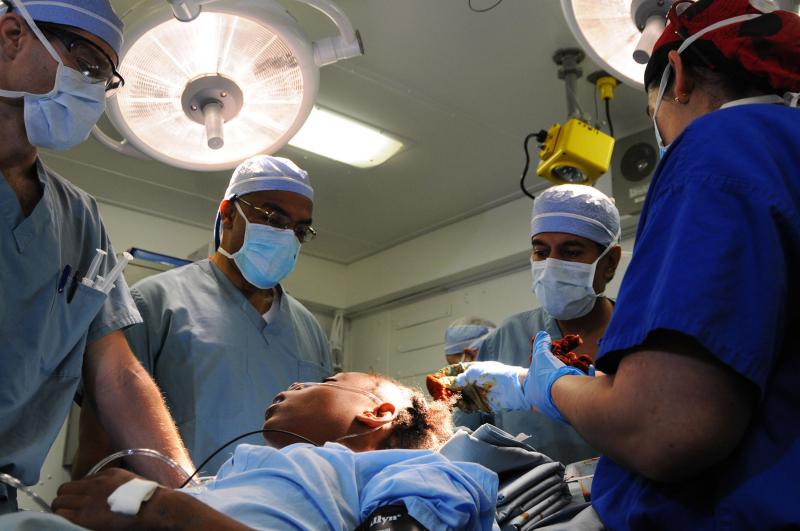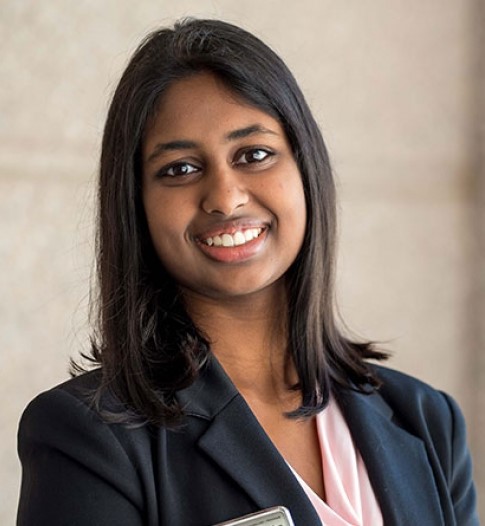
Angela Madira started her university career aged 12, but her interest in a career in paediatrics began at age five.
There is no point in doing education if you are not planning to give back twice as much as you receive.
Angela Madira
Angela Madira knew from the age of five that she wanted to be a doctor. At the age of seven she had begun to ask questions about how the brain works. By the age of 12 she was studying Biochemistry at California State University, Los Angeles. And now, at the age of 17, she is doing research in clinical neuroscience and is about to embark on an MPhil in Health, Medicine and Society at the University of Cambridge.
She puts her interest in neuroscience down to childhood curiosity. That led her to study behavioural science at university and to spend a summer at Harvard, doing research in molecular neurobiology. "It's a broad and exciting field," says Angela. She is now focusing on children's neuroscience and aims to be a paediatric neurosurgeon, but Cambridge will bring a broader, interdisciplinary perspective. "As a doctor," she says,"it is important to know why you are doing what you are doing, to question what medicine is and how it fits into the fabric of society."
Early success
Angela was born in Dallas, Texas, and lived there until she was 12 when she started university in California. Her father is a software engineer and her mother is a doctor. She has a younger sister who is now at college, aged 13.
Angela was identified as gifted and talented early, in first grade. When she was six and in first grade she went through a rigorous IQ-based assessment to join the LEAP programme for advanced students and stayed on it until she was 12 and at the end of her first year in middle school. The programme was based in her school district where Angela studied with around 20 others students of her age.
Angela says her family placed a big emphasis on education and she grew up surrounded by books. Although always focused on maths and science, she was a good all round student. She read Hamlet at the age of 10. For her the LEAP programme was a good fit, enabling her to stretch herself.
She says: “I naturally felt I was a little different from other children my age with regard to what I was interested in. At the age of seven I was more likely to be found on a bench reading The Three Musketeers than on the playground. Education was the passion that drove me.”
She enjoyed the advanced classes, but by middle school she felt the need to have more freedom and choice in what she did academically. Angela was interviewed to check she had both the academic ability and the emotional maturity to go to college, after which she was admitted to university.
Her whole family moved with her to Los Angeles, including her sister who is four years younger than her and has followed in Angela's footsteps, attending college at the age of 11.
College life
Angela was set on a career in medicine when she started college. However, she soon became interested in philosophy and historical analysis. She feels it is important that there is a crossover between science and the humanities. “Science is very specialised. You can go deep into it without communicating much about what you are doing with others. There is more than science in this world, though, and you have to be able to interconnect ideas in order to be an effective scientist,” says Angela.
Her undergraduate course, which she is just finishing, is five years long. Angela spent her first year acclimatising to college life and found the transition to independent study a challenge. "It was not the subject material that was the problem; it just took a while to adjust to the freedom and independence of the university environment. Socially there were no problems. I feel more comfortable with older people and they usually assume I am college age," she says.
Angela became more and more interested in neuroscience. She started doing research in behavioural neurobiology in her second year under Dr Amelia Russo-Neustadt at CSULA as the only undergraduate on the team. She spent the summer of her third year doing a very competitive internship at Macklis Lab at Harvard as an Amgen Scholar based on the molecular biology of neurodevelopment. Angela's research has raised both medical and ethical issues. “I was inspired to further explore the ethical concerns regarding my research through the encouragement of Dr Lucian Gomoll,” she says.
Paediatrics
Her current research is based at Children’s Hospital Los Angeles under pediatric neurosurgeon Dr Erin Kiehna. She has wanted to work in paediatrics since she was around five years old. "I enjoy interacting with children. You have the opportunity to shape someone's life," she states.
She is writing up a clinical case study for an academic journal on a girl who lost her bowel and bladder function. When she was admitted to hospital it was found that the girl had a dermoid cyst on the back of her head which was putting pressure on her medulla. "It was not malignant, but it had to be removed," says Angela. Closer examination suggested there had been some disruption in the dermoid layer during her development in the womb. "She effectively had a hairball on her brain," says Angela.
It is the first case of its kind and Angela was able to shadow the neurosurgeon operating on the girl. "I could see how much she interacted with the patient. It was not just about cutting her open. I learned you have to explain what you are doing. It is scary for children and their parents. You have to make sure they understand what the brain scans mean and make clear the risks. And you have to follow up for years afterwards. You definitely build an attachment to every single patient. It is essential to have effective communication skills and a level of empathy to make sure the patient and their family fully understand what is happening and can give informed consent."
That is why Angela believes the MPhil is vital to her development as a doctor as it is not solely science-based and includes wider social issues.
She is delighted to have been selected to be a Gates Cambridge Scholar and says this fits well with her desire to contribute to society. "There is no point in doing education if you are not planning to give back twice as much as you receive," she says.

Angela Madira
- Alumni
- United States
- 2017 MPhil Health, Medicine and Society
- Newnham College
My undergraduate career has led me to a unique journey committed to unlocking the secrets of the human brain while constantly contemplating the meaning of “ethics” in the fields of research and medicine. I have had the opportunity to study neuroscience from a molecular, physiological, and clinical perspective. In the future, I hope to use this knowledge to explore neurological disorders in children. However, I recognize that medicine is an incredibly interdisciplinary field and while I am fortunate enough to have had a science-intensive undergraduate experience, I will use my time at Cambridge to further my understanding. Through the MPhil in Health, Medicine, and Society, I will apply my previous experiences as a researcher while exploring new fields in the philosophy and history of health and medicine. I also hope to gain an international perspective of clinical and laboratory practices. My dissertation will focus on the efficacy and ethics of existing mammalian research models. I hope to target the philosophy of cognitive psychology through the multispecies interactions between humans and animals, particularly scientists and their test subjects. I am beyond grateful to the Gates Cambridge Trust for giving me the opportunity to be a part of a motivated, engaged, and gifted group of scholars and future leaders.
Previous Education
California State University, LA












